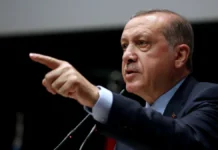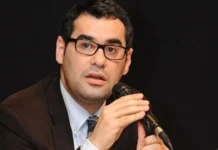President Recep Tayyip Erdoğan on Wednesday gave his approval to a proposal for the upcoming trial of jailed İstanbul Mayor Ekrem İmamoğlu, the president’s main political rival, to be aired live on state broadcaster TRT, following a similar endorsement a day earlier from his far-right ally, Nationalist Movement Party (MHP) leader Devlet Bahçeli, Turkish Minute reported.
“If Mr. Bahçeli said so, it’s a very nice gesture and hopefully it will be beneficial,” Erdoğan said in response to journalists’ questions following the ruling Justice and Development Party’s (AKP) weekly parliamentary group meeting. His brief but affirmative statement means that the parliamentary majority of the AKP and the MHP will support the opposition’s call for the high-profile proceedings to be aired publicly.
The main opposition Republican People’s Party (CHP), which has condemned the case against İmamoğlu as politically motivated, has started drafting a bill consisting of amendments to laws to allow trials of significant public interest, including that of İmamoğlu, be made accessible to the public via live national broadcast.
MHP leader Bahçeli on Tuesday said the nation had a right to witness judicial proceedings of such magnitude, describing the proposal as “reasonable and legitimate.” He framed the call as a way to allow the public to “separate the black sheep from the white sheep” and “see the truth, know the truth, and make their judgment accordingly.”
The twin endorsements from Erdoğan and Bahçeli have added rare political momentum to the idea of televising a court trial in Turkey — something not done since the early 2000s, after Turkish law prohibited the use of cameras and audio recordings in courtrooms for the purposes of public broadcast.
In the wake of the joint endorsement, legal experts and lawmakers are now looking at the legislative changes required to allow such a broadcast.
According to legal analysts, Article 183 of the Criminal Procedure Code, which currently prohibits audio and video recordings in courtrooms, must be amended. A proposed amendment would permit the broadcasting of open court hearings, provided the parties involved give consent.
Article 21 of the Turkish Radio and Television Law also requires an amendment to authorize state broadcaster TRT to air such court proceedings on one of its nationwide channels free of charge and without requiring further administrative approval.
The technical procedures for such a broadcast — including coordination between TRT and the Ministry of Justice — would be governed by a protocol drafted jointly by the two institutions.
Justice Minister Yılmaz Tunç also acknowledged the possibility of a live broadcast, noting that Article 183 of the Criminal Procedure Code currently prohibits it but that “if there is consensus, the matter is up to the discretion of parliament.” He emphasized that such a change would require a legislative amendment and welcomed Bahçeli’s call for full public transparency.
Turkey allowed live broadcast of courtroom proceedings through the 1990s, most notably during the 1999 sentencing of Kurdistan Workers’ Party (PKK) leader Abdullah Öcalan, which was aired on national networks.
The practice was formally ended with the 2005 Criminal Procedure Code, which prohibits all audio and video recordings or live transmissions from courtrooms. Since then, Turkish trials have remained open only to in-person observers, with all forms of broadcast coverage banned by law.
Erdoğan rules out early elections, says vote will be held in 2028
In his parliamentary group speech prior to the press remarks, Erdoğan dismissed opposition claims that recent investigations targeting CHP mayors are politically motivated. “The judiciary has launched an investigation into the biggest theft ring in the history of the republic,” he said, claiming that the crimes involved “an extortion network rooted in multiple provinces.”
Responding to CHP Chairman Özgür Özel’s call for early elections, Erdoğa rejected the suggestion outright. “Elections will be held in 2028, Mr. Özgür,” he said, reiterating that neither the constitution nor the election law has changed and that there is no national agenda calling for snap polls.
Erdoğan also criticized Özel personally, calling him “a caricature-like figure” and accusing the CHP of failing to accept democratic outcomes since 1950.
The crackdown on the CHP has intensified since its sweeping victories in the March 2024 local elections, with 16 mayors jailed and one put under house arrest across 17 municipalities. The government maintains the arrests are lawful, but opposition leaders argue they are part of a politically motivated effort to dismantle the party’s electoral gains through judicial means.















